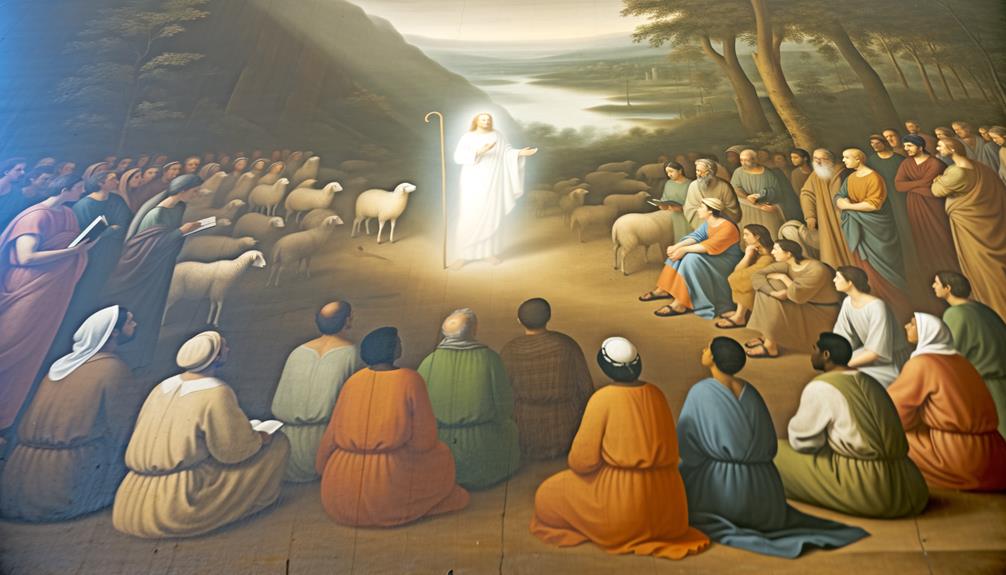Meaning of Grace and Mercy in the Bible: God’s Compassion
In the Bible, grace and mercy are fundamental attributes of God’s nature. Grace signifies God’s unmerited favor, often illustrated as a divine gift that cannot be earned, rooted in the Greek term ‘charis’ and demonstrated through Christ’s sacrificial love.
Mercy, on the other hand, highlights God’s compassionate forgiveness and willingness to relieve suffering, reflected in the Hebrew term ‘racham’ and epitomized by Jesus’ healing acts and the concept of salvation in Paul’s epistles. Together, grace and mercy offer profound insights into God’s character and His interactions with humanity, revealing a relationship founded on unconditional love and compassion.

Grace and Mercy in the Bible: Understanding God’s Love and Compassion
| Aspect | Grace | Mercy |
|---|---|---|
| Definition | Grace is the unmerited favor and blessings of God, given freely despite human unworthiness. | Mercy is God’s compassion and forgiveness, sparing humanity from deserved judgment or punishment. |
| Biblical References | Ephesians 2:8-9, 2 Corinthians 12:9, John 1:16 | Lamentations 3:22-23, Micah 7:18, Ephesians 2:4-5 |
| Key Themes | Salvation through faith, spiritual empowerment, and God’s generosity. | Forgiveness, compassion, and God’s willingness to withhold deserved consequences. |
| Purpose | To save and bless humanity, enabling believers to live in God’s presence. | To provide forgiveness, relief, and demonstrate God’s lovingkindness toward sinners. |
| Old Testament Context | Seen in God’s covenantal blessings and His provision for Israel despite their failures. | Seen in God’s forgiveness of Israel and His patience with their disobedience. |
| New Testament Context | Fully expressed in Jesus Christ, who provides salvation and eternal life through grace. | Expressed through Jesus’ sacrificial death, offering forgiveness and reconciliation to sinners. |
| Modern Relevance | Encourages believers to rely on God’s grace for salvation and empowerment in daily life. | Inspires gratitude for God’s mercy, leading to repentance and showing mercy to others. |
Definition of Grace

Grace, in the biblical context, is fundamentally understood as the unmerited favor and loving-kindness bestowed by God upon humanity.
This concept is profoundly rooted in the New Covenant, particularly in the writings of the Apostle Paul, where grace is depicted as a divine gift that cannot be earned through human effort or merit.
It underscores God’s benevolence in granting salvation and spiritual blessings to believers, despite their inherent sinfulness.
The Greek term ‘charis’ encapsulates this meaning, highlighting a transformative and sustaining force that enables believers to live righteous lives.
Grace is therefore seen as an essential aspect of God’s character, emphasizing His willingness to forgive and redeem humanity out of pure love and compassion.
Definition of Mercy

Mercy, in the biblical context, represents the compassionate and forgiving nature of God, manifesting in His willingness to withhold punishment and extend forgiveness to sinners despite their transgressions. This divine attribute is pivotal in understanding God’s relationship with humanity. The concept of mercy is illustrated through various scriptural narratives and teachings, highlighting its profound impact.
- Forgiveness of Sins: God’s mercy is evident in His readiness to pardon human sinfulness, as depicted in passages like Psalm 103:12, where He removes transgressions far from us.
- Alleviation of Suffering: Mercy is also seen in God’s intervention to relieve human suffering, exemplified by His healing miracles.
- Covenantal Faithfulness: God’s mercy underscores His unwavering commitment to His covenant with His people, ensuring their protection and provision.
Grace in the Old Testament

While the concept of mercy demonstrates God’s compassionate forbearance, the Old Scripture’s portrayal of grace reveals His unmerited favor and steadfast love towards humanity, providing blessings and establishing covenants irrespective of human merit.
In the Old Covenant, grace is often encapsulated in the Hebrew term ‘chesed,’ signifying loyal love and kindness. Significant instances include God’s covenant with Abraham, where divine promises were granted independent of Abraham’s actions (Genesis 12:1-3).
Similarly, the Exodus narrative underscores the gratuitous nature of divine grace as God delivers Israel from bondage in Egypt (Exodus 6:6-8).
Through these narratives, the Old Covenant consistently underscores grace as a foundational element of God’s relationship with His people, emphasizing an unwavering commitment to humanity.
Mercy in the Old Testament
How does the Old Scripture articulate the concept of mercy, which is often expressed through the Hebrew term ‘racham,’ denoting deep compassion and tender-heartedness?
The Old Covenant frequently portrays mercy as a divine attribute, exemplified in God’s interactions with humanity. This multifaceted notion is illustrated in various contexts:
- Covenantal Relationships: God’s mercy is emphasized in His covenant with Israel, promising steadfast love and forgiveness despite their transgressions (Exodus 34:6-7).
- Intercessory Pleas: Figures such as Moses and David invoke God’s mercy in prayers, appealing for divine compassion and pardon (Numbers 14:19; Psalm 51:1).
- Judicial Acts: Merciful judgments are depicted, where God mitigates punishment or offers redemption (Jonah 3:10; 2 Samuel 24:14).
These instances collectively underscore the profound depth and enduring nature of divine mercy in the Old Covenant.
Grace in the New Testament

The New Covenant presents grace as a fundamental theological concept, often articulated through the Greek term ‘charis,’ which conveys the unmerited favor and benevolence of God towards humanity. In the New Scripture, grace is paramount, exemplified through the sacrificial love of Christ and the transformative power it brings to believers’ lives. This divine favor is not earned but freely given, underscoring God’s generosity and love.
| Aspect | Description | Biblical Reference |
|---|---|---|
| Definition | Unmerited favor | Titus 2:11 |
| Source | God’s benevolence | Ephesians 2:8-9 |
| Manifestation | Jesus Christ’s sacrifice | Romans 3:24 |
| Impact on Believers | Transformation and salvation | 2 Corinthians 5:17 |
| Continuity | Eternal and unchanging | Hebrews 4:16 |
This grace forms the bedrock of Christian faith, emphasizing a relationship built on divine generosity rather than human merit.
Mercy in the New Testament

Just as grace plays a pivotal role in the New Covenant, mercy emerges as a complementary and equally significant attribute of God’s character, reflecting His compassion and forgiveness towards humanity.
The New Scripture elucidates the multifaceted nature of divine mercy through various teachings and events:
- Jesus Healing the Sick: Numerous accounts, such as in Matthew 9:27-31, illustrate Jesus extending mercy by healing physical ailments, symbolizing spiritual restoration.
- The Apostolic Message: Paul repeatedly emphasizes God’s mercy in his epistles, particularly in Ephesians 2:4-5, where he describes salvation as a product of divine mercy.
- The Cross: The ultimate demonstration of mercy is evident in the crucifixion, where Jesus’ sacrificial act epitomizes God’s profound compassion and willingness to forgive humankind’s sins.
Parables Illustrating Grace

Frequently woven into the narratives of the New Scriptures, parables serve as profound didactic tools to elucidate the concept of grace, offering rich, illustrative insights into its nature and implications.
The Parable of the Prodigal Son, for instance, epitomizes divine grace through the father’s unconditional forgiveness and acceptance of his repentant son, despite his waywardness.
Similarly, the Parable of the Workers in the Vineyard demonstrates grace by highlighting the landowner’s sovereign generosity, paying each worker equally regardless of their labor duration.
These parables underscore that grace is unmerited and lavishly bestowed by God, transcending human notions of fairness and merit.
They collectively illustrate the transformative and inclusive nature of divine grace, challenging believers to emulate such profound generosity.
Parables Illustrating Mercy

Exploring the parables of Jesus reveals deep insights into the nature of mercy, exemplified through stories that emphasize compassion, forgiveness, and the alleviation of suffering.
These parables provide profound lessons on how mercy operates within the framework of Christian ethics:
- The Good Samaritan: Demonstrates mercy through the Samaritan’s compassionate care for a wounded stranger, transcending socio-cultural boundaries.
- The Unforgiving Servant: Highlights the necessity of extending forgiveness to others, reflecting the mercy one has received.
- The Prodigal Son: Illustrates a father’s boundless mercy and forgiveness upon the return of his repentant son.
These narratives underscore the critical role of mercy in human relationships and divine interaction, offering timeless principles that resonate with contemporary audiences seeking deeper understanding.
Grace in Christian Living

Building upon the profound lessons on mercy illustrated through Jesus’ parables, an examination of grace reveals its transformative power in the daily lives of Christians, shaping their actions, attitudes, and relationships.
Grace, understood as unmerited divine favor, is pivotal in guiding ethical conduct and fostering spiritual growth. It compels believers to extend kindness, forgiveness, and compassion, mirroring the benevolence received from God.
In practical terms, grace manifests in acts of charity, patience in adversity, and the pursuit of righteousness. The Apostle Paul emphasizes grace as the foundation for salvation and sanctification, thereby underscoring its essential role in Christian discipleship.
Consequently, grace not only redeems but also empowers Christians to live in accordance with divine principles.
Mercy in Christian Living

Mercy, characterized by compassionate treatment towards others, plays an indispensable role in the ethical and spiritual dimensions of Christian living. It manifests through various facets, embedding itself into the daily practices and beliefs of adherents.
To begin with, forgiveness is a fundamental aspect, urging believers to pardon others as an imitation of divine clemency.
In addition, almsgiving reflects mercy’s tangible application, promoting acts of charity and support for the less fortunate.
Thirdly, reconciliation underscores the importance of restoring broken relationships, thereby fostering communal harmony.
These practices not only exemplify mercy but also serve as proof of living out the teachings of Christ.
Understanding and embodying mercy augments the moral fabric of Christian communities, nurturing a more compassionate and just society.
Interconnection of Grace and Mercy

The interconnection of grace and mercy in the Bible reflects a profound theological synergy where divine compassion and undeserved favor coalesce.
Mercy, as an expression of God’s compassionate forbearance, mitigates the penalties of human fallibility, whereas grace extends unmerited blessings that transcend human worthiness.
This interplay reveals a God who is both just and benevolent, offering a holistic framework for understanding divine generosity.
Divine Compassion Explained
Although often treated as distinct concepts, grace and mercy are deeply interconnected facets of divine compassion in biblical theology. Both elements reveal the profound nature of God’s love and benevolence toward humanity. Grace refers to the unmerited favor bestowed upon individuals, while mercy involves the alleviation of suffering and the withholding of punishment. In understanding these concepts, it becomes clear that grace meaning in the Bible encapsulates the idea of receiving blessings that one does not deserve, highlighting God’s generosity. Conversely, mercy emphasizes His desire to spare us from the consequences of our actions, illustrating His compassion in moments of need. Together, grace and mercy demonstrate the holistic nature of God’s care, inviting believers to respond with gratitude and a deeper commitment to living in accordance with His will.
- Unmerited Favor: Grace represents God’s goodwill, showering blessings without any requirement of earning them.
- Withholding Punishment: Mercy is demonstrated when God refrains from imposing deserved penalties, emphasizing his forgiving nature.
- Interwoven Acts: Instances in scripture often show God’s grace and mercy concurrently, highlighting a holistic approach to divine compassion.
Thus, the interplay between grace and mercy underscores the depth and breadth of God’s loving-kindness.
Undeserved Favor Illustrated
Scriptural narratives abound with examples that elucidate the intertwined nature of grace and mercy, showcasing instances where God’s undeserved favor and compassionate restraint are simultaneously manifest.
A notable illustration is found in the story of the Prodigal Son (Luke 15:11-32). Here, the father’s reception of his wayward son exemplifies grace—bestowing unmerited favor despite the son’s reckless actions. Concurrently, mercy is evident in the father’s willingness to forgive and not enforce deserved retribution.
Similarly, David’s encounter with Bathsheba (2 Samuel 11-12) reveals both aspects: God’s grace in preserving David’s kingship and His mercy in sparing David’s life.
These narratives intricately demonstrate how grace and mercy coalesce, providing profound theological insights into God’s relational dynamics with humanity.
Conclusion
In the grand tapestry of biblical literature, grace and mercy emerge as threads of divine benevolence and compassion, intricately woven to depict a deity both just and loving.
The Old and New Scriptures, replete with parables and teachings, underline these virtues as foundational to Christian ethos.
Indeed, without grace, the concept of unmerited favor would be lost, and without mercy, divine compassion would merely be a myth.
Consequently, grace and mercy, in their intertwined magnificence, shape and sustain Christian living.






